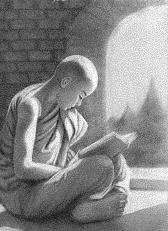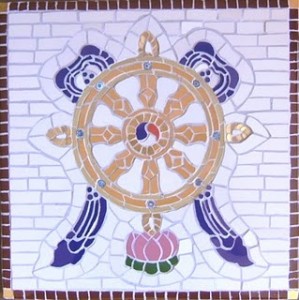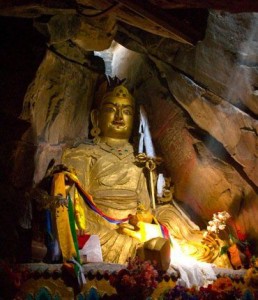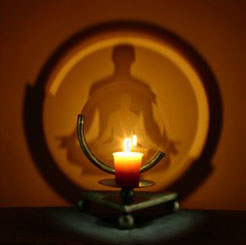
An excerpt from a teaching called the Eightfold Path by Jetsunma Ahkon Lhamo
Right effort is the blood of the Eightfold Path. It is the sort of like a precursor, because you have to establish right effort and there has to be effort for the path to work. To engage on the path, you have to be rightfully making that effort to engage on the path.
Now, there is no shortage of effort in our lives here in the US. Contrary to what struggling people might think. In other countries where survival is an issue, one works very hard from dawn to dusk, and probably most days of the year, but for Americans survival is not so difficult and so it looks as though we have a lot of leisure time. In fact we do have a lot of leisure time relative to other unfortunate sentient beings. And that’s why we have the opportunity to practice. But there is no shortage of effort in our lives.
We are actually very hard at work. We have determination. Americans have a lot of ingenuity. You know? We can be a strong people. So, right effort is something that we have to understand. Its not that there is a shortage of effort, but you have to determine what is the right effort?
On this path, nothing will be achieved if we do not contemplate, study and practice right effort. What is behind right effort is our own mental energy. Everything that we experience is from mental energy. Everything that we interpret is about our mental energy. The lens of our mind, the habitual tendency of our mind controls how we experience. For those of us who are habituated to living in a certain way, we have to take very specific steps and efforts. A great example of this are the steps that recovering alcoholics must take, because the seduction of alcohol is so all-pervasive and the habit so strong and reinforced by the drug alcohol itself. People use alcohol in a self-medicating way. As far as I’m concerned, getting sloppy drunk is very unattractive, and not that much fun, and the next day it’s not very fun either. So I don’t think that’s what draws people. I tend to think that they are self-medicating. That they are suffering in some way, and they think, “This will do it.” Sometimes we are depressed, and we self-medicate. I’ve known people that have mania who self-medicate. And they use whatever they can get their hands on. Some people just have pain in their hearts, and are too thin skinned for the world. I’ve known alcoholics like that who underneath it were very vulnerable, very pure, delicate people who just can’t take it. And so they drink. They don’t know that there’s another answer.
It takes a lot of effort to drink that much. It takes a lot of effort to self medicate. It takes a lot of effort to do the things we do to cope, get to work, get home, take out the garbage, send the kids to college. All this stuff is so effortful, and we know exactly how to do it, because society trains us to do it.
Right effort invites us to train differently. We are always exerting effort. Right effort brings us fulfillment, peace of mind, and certain contentment. Unwholesome effort leads to mental confusion. If you want to be mentally confused, just keep right on with the ordinary efforts without any guidance and you will keep spinning around in samsara like a bee in a bottle.
Let’s say a person leaves the path. For whatever reason they find dissatisfaction with the path. Heads up on that. That tells you something right there. If you leave the path, if you find dissatisfaction with the path, it is because you haven’t done it right. The path is the path. It leads to liberation if you work it right. If you don’t’, you just look stupid because you haven’t done it right. And so most people that leave haven’t done it right.
Having done some right effort in order to travel on the path and do some practice, they maybe gained some benefit, but karma ripened. They didn’t quite get it right. Didn’t keep themselves inspired on the path. Didn’t really keep Vajra confidence when they were moving forward on the path. And now all that attention and energy that they used to put into meditation and the path, they now put into gossip, wrong-headed and harmful activities such as speaking ill of others, or trying to destroy others, or trying to destroy another person’s path or trying to destroy an organization or something like that. The person who is doing it feels in their mind right. They feel self-righteous. Of course you know that there is no room for self-righteousness on the path because there is no self, and the attachment to righteousness is something that we should be working on right now. Being right. Being in charge. Being on top. All that stuff is just attachment and desire, and that’s something that we should be working on right away.
Lets say that this person is doing all of these negative things, and they feel righteous. They feel they have the right to do this. If they didn’t get anywhere on the path, they make the path wrong. And they say, “Well, the path is just nothing. It doesn’t help, and I’m not happy in it, and therefore its wrong.” Once they make that decision they go off and try to seek happiness in another way. At first, if they have a lot of anger, maybe vengeance, maybe they just let their anger rip? After trying to work with it for many years, they just let it rip. Letting the monster out of the closet that was always in there, and probably was the problem in the first place. So, this person is now engaged in unwholesome activity and what will happen to this person? If a person like that wants to do some harm, if they get a punch in, they feel a kind of satisfaction. Does anybody know what that kind of satisfaction feels like? It’s an evil, dark, stinky, smelly kind of satisfaction. Not wholesome. Not helpful. Not going to make the world a better place. Nothing but harm doing. And when that person has that feeling of unwholesome, victorious satisfaction, their mind then becomes more aroused and inflamed, like a giant mental zit – inflamed, pussy, and nasty. That’s how the person’s mind becomes.
If a person has manic-depressive disorder, in the state of mania, it is very hard to be kind. It is very hard to have good judgment and it is very hard not to be raging and angry in mania. It is very hard. You don’t have any kindness when you are manic. You are just too enraged.
Psychiatrists will tell you that if you are a manic person, a bipolar person you tend to go up and down. What happens if you are not treated is that your mind, which is like a muscle exercising, learns how to go up and down, up and down, up and down. It habituates to being all over the place. No steadiness there. No stability. It’s up and down, up and down. Some people with bipolar disorder can cycle through moods in a day. Other people go through seasonal cycles – manic in the summer and then lower in the winter.
What I’ve learned is that if manic-depressive disorder, because there is so much rage in it, goes untreated, then over the years it tends to make the mind toxic, and it leads to dementia. It is not because there is a direct correlation, and it won’t be a strict dementia like old age dementia that tends to have certain parameters, but it leads to a kind of discombobulation. What happens is that the mind is so filled with stress hormones, so filled up with the inflammation of rage and anger, and in mania tends to go round and round and round and round with no solution. If untreated, then as a person ages, the mind becomes so toxic that even if a person goes for treatment in their older age, the first thing that has to be done, is treat them for this brain toxicity, before you can even treat them for the bipolar disorder, which is the disorder. A lot of times you have to backtrack by using anti-psychotics. You have to backtrack and detoxify the mind until you can get to where you can treat it. And that’s the main reason why when I see a person who I recognize as having the symptoms of bipolar disorder, I beg them to go get treatment because I see what happens to people who are untreated for such a long time and what happens to their mind. At that point the mind becomes unreachable. When the mind is toxic, it is unreachable. Anger is the king. Inflammation is the queen, and running around is the baby.
It matters so much how you structure your inner mental life. Many people think that as long as their behavior is good, it doesn’t matter what’s going on in their mind. For instance, you can think about kicking puppies in your mind but on the outside you are really kind to puppies, and think that it’s okay. It’s a silly example, but the actual truth is that it’s not okay. The actual truth is that one will bring the other about. Eventually, if the mind stays in that condition without changing, then the outer behavior will change. And so it is imperative that we make the correct effort, the right effort, and that is to study, contemplate, and understand, to begin to look at the nature of your perception and your mind, and to actually put in the time and the effort to study.
You practice Right Effort by preventing unarisen unwholesome states from arising, abandoning unwholesome states that have already arisen, arousing wholesome states that have not yet arisen, and maintaining and perfecting wholesome states that have already arisen.
1. Prevent the arising of unarisen unwholesome states So, through good contemplation and right effort, you can prevent the arising of new habits by simply not engaging in them. You make an effort not to engage with an unfortunate habit.
2. Abandon unwholesome states that have already arisen With right effort examine your mind, examine your life, examine your habitual tendencies and see what needs changing. To begin to abandon unwholesome states that have already arisen can happen through antidoting behavior. For instance, if you are extremely selfish, you have to practice little by little learning to give. Practice little by little even if it’s just a flower or a dollar or a gift or even something of your own that you treasure very much. Right effort would be learning to give that joyfully. So abandon already unwholesome habits.
3. Arouse wholesome states that have not yet arisen What would that look like? It would be practicing generosity. If you are that person who is selfish, then practice generosity in everyway that you can. If you are not nurturing and kind and you really admire people like that and want to be that way, then you can practice five minutes at a time. You put the right effort into stepping outside of yourself and looking at the other being to see what they need, what would make them happy. To think of others before yourself. It’s a practice that’s very simple but no one does it. To put others in front of you and say, “How can I support this person?” Rather than always being the one whose getting support and needing support, and wanting support. That’s not really a wholesome habit. That’s a dependency habit. If you were to practice and realized that you’re like that, there’s no shame in realizing that. You have to realize that you’re like that. But then little by little you begin to act differently. And at first its baby steps. And then eventually those baby steps become habits. And eventually those habits become recognition and awakening. And even on the simplest level, lead to a better life.
4. Maintain and perfect wholesome states already arisen You examine them and you find that you have certain good qualities. Like lets say, you feel yourself to be very interested in the Dharma, interested in a real way. It excites you. You really like the thought of it. You like the practices, you like the atmosphere, you like everything about it. That’s a wholesome condition because if you’re going to have an attachment, then have an attachment to Dharma because if you’re practicing it right, it will take care of itself. Lets say that you have that habit and you really like Dharma, and you decide you’re going to use that to help others to like it. Lets say, you want to become a chopon (person who handles the spiritual substances in puja) or an umdze (practice or chant leader). You become really practiced at that. That would be taking a natural wholesome habit and bringing it up to the next level.
Lets say that you basically like animals. You like dogs. That’s a good habit, as long as you’re not too attached to them and you’re not like an animal hoarder or something. But say you like dogs. What would you do about that? Your next step would be, “How can I help them?” How can I alleviate their suffering?” Same thing with the birds. You know, I love that birds are so beautiful. We love them but do we take the next step, which is to make their lives less horrible and more wonderful? That’s the kind of habitual tendency that you constantly invite yourself to take and go over and make firm in your mind. It’s so important to understand that on the pat. That’s really the basis of everything. To be on the path and not make any effort, one is not on the path. One is simply along for the ride. And it won’t last.
A person who is on the path and makes no effort to correct their mind habits and is still mean and hateful and angry, and makes no effort to correct that, is not practicing the Buddhadharma, even if they are wearing the robes, even if they have got the beads. No matter what, they are not practicing the Buddhadharma, because the Buddhadharma is about making one’s mind wholesome.
© Jetsunma Ahkon Lhamo




